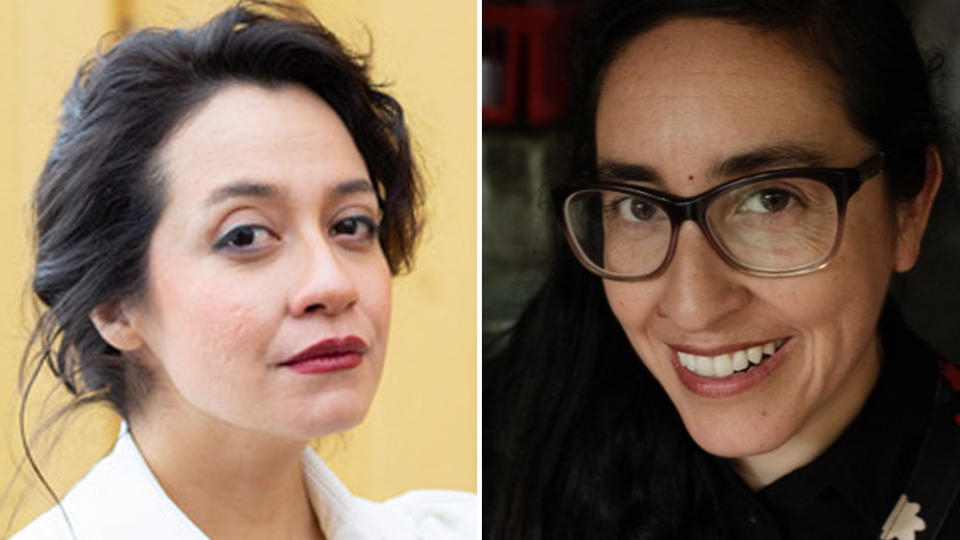Ventana Sur Highlight ‘Elena,’ Written by Cannes Camera d’Or Winner César Díaz, Boarded by Joachim Lafosse Producer Stenola (EXCLUSIVE)

Belgium’s Stenola Productions, behind Joachim Lafosse’s 2022 Cannes Competition player “The Restless” and this year’s San Sebastian’s Golden Shell contender “A Silence,” has boarded “Elena,” written by Cannes Camera d’Or winner César Díaz (“Our Mothers”) and a potential highlight at this month’s Ventana Sur Proyecta forum.
Stenola, which looks set to handle part of post-production, joins Norwegian lead producer Staer, founded by Elisa Fernanda Pirir, and Lithuania’s Just a Moment on a film which marks the anticipated feature debut of Dalia Huerta Cano, whose “Flesh That Remembers” won best doc short at Mexico’s Morelia Film Festival and DF Docs.
More from Variety
Producers Ragna Midtgard and Pirir and director Dalia Huerta will attend Ventana Sur, a joint venture of Cannes Marché du Film, the Cannes Festival and Argentine film-TV agency INCAA, to court a sales agent and Latin American partners in Mexico and Guatemala to develop the screenplay.
Scheduled to shoot in 2024, and pre-sold in Norway to prestigious public broadcaster, NRK, and supported with development funding from the Norwegian Film Institute, the power of “Elena” comes in part from its take on the emotional fall-out from the actions of big European conglomerates in Latin America which most Europeans will never have thought about.
Equally, the Guatemalan-born Pirir noted, “Elena” is “one of the few films that dares to criticize European responsibility for participating in mining and hydropower projects in so-called developing countries.”
Set in contemporary Guatemala, the film tracks Elena, 19, daughter of an activist mother who is totally immersed in battling the building of a Norwegian hydro-power plant in the local valley.
Elena supports her mother’s struggle. But her life dream is to study to become a teacher, but if she leaves who will take care of her family, the village and the ongoing fight against the European hydro-electric station? Elena is made to feel like her life and dreams are not as important as her mother’s fight.
“I want to communicate Elena’s feelings that day in her life, the day she felt almost invisible. The day she made the choice to follow her dream. I want to be with Elena. Usually the protagonist is the hero, but Elena gives us a deeper look into the conflict, a more human perspective,” Huerta Cano has said.
“We are absolutely delighted to be able to support this project in co-production with Staer and Elisa Pirir. I discovered the screenplay for ‘Elena’ a few weeks ago with great enthusiasm and emotion,” said Stenola’s Eva Kuperman.
‘Elena’ transports us into a powerful story in the heart of Guatemalan lands. I appreciated the atmospheres that were both moving and tense and the sense of accuracy in the mother-daughter relationships. This coming of age tale is clearly a great promise of cinema with the breath of modernity which will make the film unique. Co-writing with César Diaz gives Belgium a special place in this fabulous film in the making.”
Huerta Cano, Pirir and Díaz have shot a teaser short, “Almost Invisible,” in collaboration with members of Guatemala’s La Puya which from 2012 fought a five-year battle to halt work at a gold mine operated by Nevada-based mining company Kappes, Cassiday & Associates (KCA), located just north of Guatemala City. In 2017, Guatemala’s Constitutional Court ordered work in the mine to be suspended, making way to a community consultation process.
The teaser also hints to Huerta Cano’s visual style which may carry over to the feature: A rich tonality, carefully composed frames which pick up on details of environment; a story which is close to reality in its characters and village setting; thought-through meaningful shots of resonant symbolism, such as the the daughter stares into her reflection in water in a bowl, a fence behind her; the emergence of water as a continual motif, given its access the crux of the confrontation between La Puja and the Norwegian hydro-electric plant.
Huerta Cano anticipates that in order to understand Norway and the Nordic invasion, “I want to use visual cues. I imagine a landscape with strange elements, such as huge white people who use lasers to measure the water level in the river, machines that look like futuristic robots and ultra-modern electronics in a place that always has had limited access to electricity.” The sum, she adds, is a science fiction universe, which are the building blocks of magic realism: every time Elena can’t communicate what she’s feeling, she’s alone in the Guatemalan jungle and it’s snowing. “It’s an allegory for Norway and how what’s happening is affecting her on an inner deep level.”
“Elena’s” storyline also has wider resonance. Díaz’s mother was politically engaged during Guatemala’s Civil War; Pirir’s parents participated in the student uprising at its end and “had to face the consequences,” Pirir said, Pirir emigrating with her mother to Norway in 2007. Having to leave her home country was “one of the most painful moments in my life; even though I always supported and understood her fight,” she added.
Shooting “Almost Invisible,” based on the shared experiences of myself, our female crew, and actresses, we decided to talk about a feeling we share in common,” said Huerta Cano. “We shared the experience of harassment, the pain, and how we silence it because it doesn’t seem important enough in the middle of the chaos, the war, and the fighting to defend our territory.”

Best of Variety
Sign up for Variety’s Newsletter. For the latest news, follow us on Facebook, Twitter, and Instagram.

 Yahoo News
Yahoo News 
